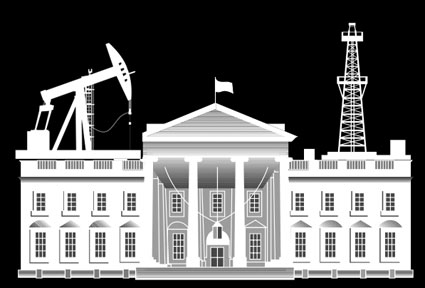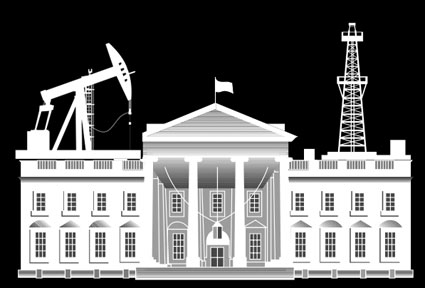 To shape the government’s long-term response to the Gulf oil calamity, President Obama recently formed an independent, bipartisan commission to investigate the origins of the leak and BP’s efforts to control it.
To shape the government’s long-term response to the Gulf oil calamity, President Obama recently formed an independent, bipartisan commission to investigate the origins of the leak and BP’s efforts to control it.
Yet one of the commission’s two co-directors, former EPA chief William K. Reilly, sits on the board of directors of the oil giant ConocoPhillips and the chemical company Dupont, which supplies goods and services to the oil industry. (Hat tip to The Maddow Blog.)
Now, Reilly is no doubt a relatively benevolent oilman. Grist contributor Osha Gray Davidson recently profiled him quite favorably on the El Phoenix Sun blog, portraying Reilly as a “bona fide environmentalist” whose Sonoma County home is powered by solar panels. According to Davidson, Reilly did good work at EPA under George H.W. Bush — “until conservatives in the administration who had always seen Reilly (and all environmentalists) as a political liability” undermined him ahead of the 1992 election.
But the fact remains Reilly is literally on Big Oil’s payroll. According to the PEU Report, Reilly brought home $246,515 in compensation from ConocoPhillips in 2009, and another $279,526 from Dupont. (Forbes has compensation numbers for previous years.) Reilly holds stock in the two multinationals valued at about $2 million apiece, PEU Report states.
ConocoPhillips, it must be noted, has offshore-drilling projects lined up that will be affected by the commission’s findings. Just after Obama announced his plan to dramatically expand offshore drilling in March — before the Deepwater explosion — the company was primed to move ahead with projects in Alaska’s environmentally sensitive Chukchi and Beaufort Seas. “Our understanding is that today’s announcement means exploration and development of existing Chukchi and Beaufort leases can proceed,” a company spokesman told Reuters.
Reilly’s conflict of interest in this case seems clear. Imagine the outrage if George W. Bush or a hypothetical President McCain had appointed a paid-up oilman, benevolent or not, to such a position. But Obama gets a free ride. Why?
Now, Reilly is not the first Obama appointee with direct ties to the oil industry. Indeed, two former BP execs now occupy high posts within, respectively, the Department of Energy and the Minerals Management Service. In March 2009, the president named BP’s chief scientist, Steve Koonin, to the post of undersecretary of science to the Department of Energy. The pick drew little criticism within green circles at the time — perhaps because at BP, Koonin’s role was evidently to take the oil giant “beyond petroleum.” As Koonin’s DOE bio puts it:
At BP since 2004, Koonin was responsible for the long-range technology strategy of going ‘beyond petroleum’ to alternative and renewable energy sources, providing technical advice to senior executives, and managing in the firm’s university-based research programs.
In retrospect, the lack of protest around the choice of Koonin seems foolish. Well before the calamity now transpiring in the Gulf, BP’s “beyond petroleum” campaign was looking like a farce. Its pre-Deepwater Horizon safety record, for example, was much worse than that of its much-vilified rival Exxon. According to ABC News:
In the last five years, investigators found, BP has admitted to breaking U.S. environmental and safety laws and committing outright fraud. BP paid $373 million in fines to avoid prosecution. BP’s safety violations far outstrip its fellow oil companies. According to the Center for Public Integrity, in the last three years, BP refineries in Ohio and Texas have accounted for 97 percent of the “egregious, willful” violations handed out by the Occupational Safety and Health Administration (OSHA).
And what of BP’s much-heralded investments in alternative energy? They turn out to be so sparse that in 2008, Greenpeace UK awarded the company its “Emerald Paintbrush award for worst greenwash.” In 2008, Greenpeace reports, the company put $20 billion — 93 percent of total investments — into oil and gas exploration. Solar and wind projects got 1.39 percent and 2.79 percent, respectively.
For all we know, Koonin could well have been a progressive force within BP. Like Reilly, he seems like a relatively benevolent oilman. Still, he was the public face of a campaign that turned out to be a green gloss on a company whose long-term fortunes are clearly tied to petroleum drilling, processing, and vending. Why should we expect him to move the Department of Energy “beyond petroleum,” when he so clearly failed to do so for BP?
Then there’s Sylvia V. Baca, whom Obama tapped last summer to serve as deputy administrator for land and minerals management at the now-infamous Minerals Management Service. As Mother Jones’ Kate Sheppard reported last week, Baca had spent her previous eight years as a BP exec. Kate points to Baca’s official MMS bio:
Baca had been general manager for Social Investment Programs and Strategic Partnerships at BP America Inc. in Houston, and had held several senior management positions with the company since 2001, focusing on environmental initiatives, overseeing cooperative projects with private and public organizations, developing health, safety, and emergency response programs and working on climate change, biodiversity and sustainability objectives.
The bit about “health, safety, and emergency response programs” should give us pause. As noted above, BP has the worst safety record of any oil major operating in the United States. As for “emergency response,” the company was woefully unprepared for a blowout at Deepwater, as evidenced by the experimental nature of its attempts to plug the leak — and their repeated failures.
And where did Baca work before setting up shop at BP? Why, at the Mineral Management Service. Sheppard aptly dubs Baca an “excellent example of the revolving door between government and industry.”
I frankly find it pathetic that Obama’s oil-soaked appointments have not inspired public outrage in light of the ecological calamity taking place in the Gulf. It’s as if Obama’s status as “not-Bush” has lulled progressives into a stupor. But getting the Texas oilman out of the White House obviously did not end the industry’s influence over the executive branch.
If Obama is serious about confronting climate change and reducing oil dependency, he can start by purging his administration of petro hacks. But I doubt he’ll do so without a major push from progressives.




